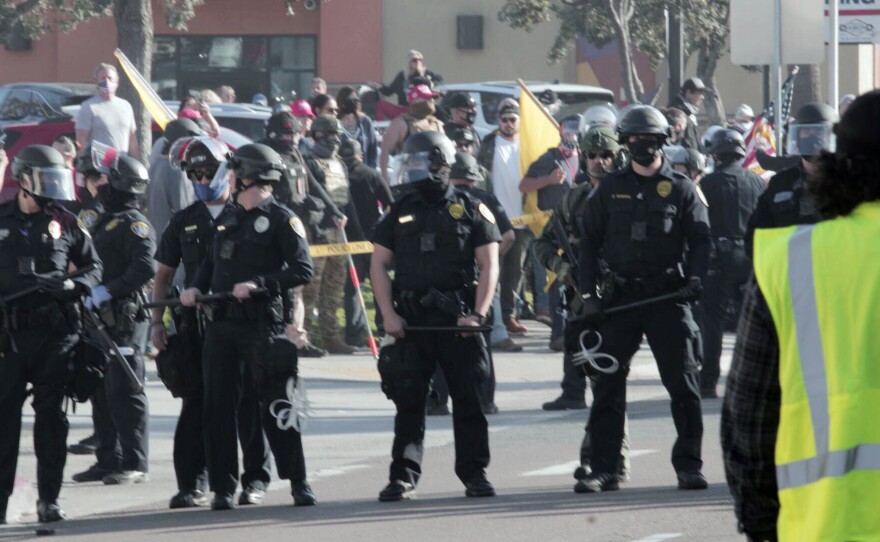For years, San Diego community advocates have been calling for cuts to the police budget and more funding for libraries, parks, affordable housing and social services. After the murder of George Floyd last year, those calls overwhelmed the City Council's final budget meeting.
Those hoping to see a reduction in police funding under the new administration of Mayor Todd Gloria were disappointed last week. His proposed budget includes a roughly $19 million increase in the police budget.
The mayor's office has said the majority of that increase is due to factors beyond Gloria's control. This year the city is legally required to pay an extra $15.1 million into the pension fund that supports retired police officers. It's also budgeting roughly $4.5 million to cover other non-discretionary expenses like rising insurance rates and utility bills.
And while the overall police budget would go up under Gloria's proposal, police overtime spending would go down by $4 million. That savings would go toward youth programs and the city's new independent police oversight commission.
RELATED: San Diego Police Routinely Blow Past Overtime Budgets
But those measures are not likely to satisfy activists who see Gloria's proposed police budget as, at best, a continuation of the status quo.
"There's been a study of what's happening in the police budget, and there are clearly places where we can make reductions and be able to redirect those funds to things that are really going to deliver safety for San Diegans," said Kyra Greene, executive director of the progressive think tank Center on Policy Initiatives (CPI).
While the City Council has largely gone along with past increases to police budgets, that may no longer be the case. Councilmembers Monica Montgomery Steppe and Sean Elo-Rivera both voiced concerns over the increased police spending at the April 20 meeting after Gloria officially presented his spending plan.
"It's very clear that we need to look at reallocating some of the funding and investing more in our communities," Montgomery Steppe said. "That is how we reimagine policing."
RELATED: SDPD, Sheriff Still Owe Public Hundreds Of Police Shooting And Use Of Force Records
First among the priorities that CPI and other like minded organizations list in their "People's Budget" is the dissolution of SDPD's "street gang and gang intervention units," which activists say are a major source of well documented racial disparities in the city's police practices.
Greene said the city could meet its police pension obligations and still reduce the police budget by replacing sworn officers with unarmed first responders to investigate non-emergency situations. Even when an alleged crime is taking place, Greene said, the city could develop alternatives to traditional policing.
"This moment around George Floyd I think highlights this," Greene said. "The question is whether a person with a gun needs to show up over something about $20."
Former Minneapolis police officer Derek Chauvin was convicted this week of murdering Floyd, a 46-year-old unarmed Black man, after he was accused of using a counterfeit $20 bill in a convenience store.
The mayor's office has pointed to steps Gloria is already taking to reduce the city's reliance on police officers to manage the city's homelessness crisis. Last month he announced the city was contracting with the nonprofit People Assisting the Homeless (PATH) to hire outreach workers tasked with engaging the homeless population and building trust. And he has directed police to keep their distance when accompanying sanitation workers who clean up homeless encampments.
RELATED: San Diego Police Practice Their People Skills On Social Media With Help From Consultant
Gloria has also proposed a handful of policy changes that he hopes will address SDPD's disparate treatment of Black and Latinx residents. Data show they are more likely than whites to be searched when detained by police, but less likely to be found with contraband.
Among the proposals is a still-undefined limit to "pretext stops," when an officer detains someone under the pretext of a traffic violation or minor crime but does not have probable cause to make an arrest. Activists have called for the practice to be banned all together — something Gloria rejects.
Ultimately, a net reduction in the dollars San Diego spends on its police department may require cutting the number of sworn officers or civilian employees. Gloria told KPBS last week that is something he is not prepared to do, at least for now.
"That would have been significant service level reductions at a time when people are counting on the city to support their needs right now," Gloria said. "I don't think that's appropriate. I think we can do this over a course of years."






